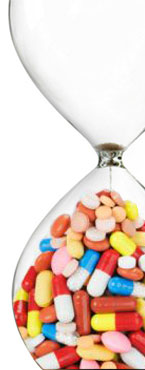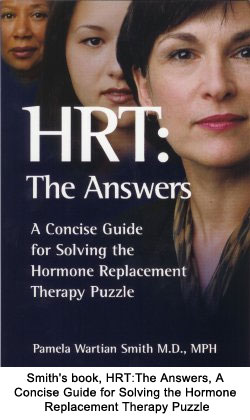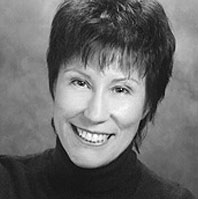Dr. Pamela Wartian Smith is part of a growing group of “anti-aging” physicians, who say the secret to longevity is the right mix of healthy living and hormonal therapy.
Tell us below—what’s your experience with hormone replacement?
 Fifteen years ago, Pamela Wartian Smith was an ER doctor at The Detroit Medical center when all of a sudden she couldn’t sleep. “I went to 11 physicians and not one could tell me why,” she remembers. “The only advice they gave was to take a sleeping pill.” By chance, she attended an anti-aging conference, where she heard about the loss of progesterone affecting sleep habits. Turns out, her own progesterone level was zero thanks to a hysterectomy performed several years earlier. “At the time of the surgery, I was told I wouldn’t have any hormonal changes because they left my ovaries intact. We now know that when you cut the blood supply to the ovaries, you do have hormonal changes.” She began taking a low dose of progesterone. “Now I sleep like a baby,” she says.
Fifteen years ago, Pamela Wartian Smith was an ER doctor at The Detroit Medical center when all of a sudden she couldn’t sleep. “I went to 11 physicians and not one could tell me why,” she remembers. “The only advice they gave was to take a sleeping pill.” By chance, she attended an anti-aging conference, where she heard about the loss of progesterone affecting sleep habits. Turns out, her own progesterone level was zero thanks to a hysterectomy performed several years earlier. “At the time of the surgery, I was told I wouldn’t have any hormonal changes because they left my ovaries intact. We now know that when you cut the blood supply to the ovaries, you do have hormonal changes.” She began taking a low dose of progesterone. “Now I sleep like a baby,” she says.
Since then, Smith has been a pioneer at the forefront of “metabolic anti-aging medicine,” a discipline that’s received lots of attention, from those who dismiss it as fountain-of-youth folly to patients who credit it with saving their health and their sanity after menopause (ie: Oprah Whinfrey). At the core is hormone replacement therapy—a controversial topic for women and the doctors who treat them.
As the director of the Center for Healthy Living and Longevity in Traverse, MI, Smith treats thousands of patients with a combination of diet, exercise and hormonal therapy intended to prevent disease and preserve wellness far past the age of fifty. This spring she sat down with FOF to explain how, “The science is there for us to live to a healthy 100.”
- What’s the connection between hormones and what you do–“metabolic anti-aging medicine”?
- Hormones are a key component for how healthy we stay as we age. Estrogen has 400 functions in the body. It affects taste, touch, smell, hearing, skin tone. It lowers cholesterol and blood sugar and maintains memory and bone structure.
- Everything.
- Yes, and right now our medical system is set up to treat the symptoms of aging with all different drugs. Metabolic and anti-aging medicine is a very different field. We look at the cause of the problem. So yes we could give a woman medication to treat her high cholesterol, but if we can treat the cause—hormonal imbalance—why not do that?
- Let’s address the obvious: What about the link between estrogen replacement and breast cancer?
- The key is that there are 3 estrogens in a woman’s body. We never replace e1 estrogen, because it’s linked to breast cancer. e2 is the one with 400 functions and e3 is the one that actually helps prevent breast cancer. Also, it’s important to use low-dose hormone replacement—not bombard the patient like we’re trying to get her pregnant.
- Is estrogen the only hormone that matters?
- Progesterone is just as important. It helps prevent breast cancer and builds bone. Women without progesterone tend to have anxiety, irritability, insomnia, mood swings, depression and bladder problems. Testosterone provides a sense of well-being and burns fat. We need to measure all these things.
- How do you measure hormone levels?
- A saliva test or a 24-hour urine test. Measuring in the blood doesn’t tell us what’s going on in the entire body. For example, a woman has estrogen receptors in her eyes, so the hormones are in a lot places besides the breast tissue and the gonads.
- Can you ask your regular doctor to perform these tests?
- You probably need to see a metabolic expert who’s done this–someone who’s done a two-year fellowship and is also in a program to get a master’s degree in this field. Not someone who has taken a weekend course and calls himself a metabolic specialist.
- Where do you find doctors like that?
- Worldhealth.net. Women can also email me if they want to and I can help them find a doctor. There’s only one training program in the United States, and that’s at the University of South Florida School of Medicine.
- Once you assess hormone levels, what’s next?
 We create a prescription for natural hormones that’s individualized just for you. Out of 3,000 patients in my own personal practice, no one gets the same thing. And that’s the future of medicine—personalized care.
We create a prescription for natural hormones that’s individualized just for you. Out of 3,000 patients in my own personal practice, no one gets the same thing. And that’s the future of medicine—personalized care.
- What do you mean by “natural” hormones? I’ve heard a lot about natural vs. synthetic.
- “Natural” means that it’s the same chemical structure that God gave you. We also call this “bioidentical.” Synthetic to a scientist means, “not the same chemical structure.” To the layperson, “natural” means it comes from a plant. In this case it’s natural by both scientific and layperson definitions. It’s developed from yams or soy.
- So these hormones are being cultivated from vegetables?
- Yes, they come from yams, and then an enzyme is added to the yam so it works in a human being.
- Would eating a lot of yams help to balance your hormones?
- Unfortunately not, because you have to add the enzymes.
- A lot of women don’t want to take hormones because they think, “Why should I be putting hormones in my body if I’m naturally losing them?” How do you respond to that?
- That’s an excellent question. We’re really not naturally losing hormones. If we’re not stressed, then the body makes enough hormones on its own after menopause to maintain function. The trouble is that everyone is so stressed now—we’re in a 24/7 world. The stress hormones dhea and cortisol are part of your hormonal symphony and they throw other hormones off.
- So this is a symptom of the modern age? The level of stress causes people to have less hormones than they should have?
- Yes. There’s a normal hormonal decline that allows us—fortunately—not to have children at the age of 60. But we should be able to still maintain function.
- Okay so along the lines, are there things you can be doing to regulate the stress, so you need less hormones or your hormones balance themselves more naturally?
- Absolutely. We offer stress reduction techniques—prayer, meditation, Thai chi, yoga, exercise, massage, breathing techniques. And we can also use herbs and extracts very effectively.
- What do you say to a woman who knows stress is her problem, but also can’t afford to restructure her life completely. I mean, we can’t all just start doing yoga all day.
- You do the best that you can. Some of those things—like breathing techniques—you can even do at your desk. And just 10 minutes a day would help a great deal.
- Do you recommend a book for stress reduction?
- Adrenal Fatigue by James Wilson—it looks at the stress hormone—it’s very fascinating.
- So if a woman is doing everything she can in a natural way—stress reduction, herbal remedies, etc—what questions should she be asking her doctor about hormone replacement therapy?
- I would encourage people not to go to their primary care doctor for a prescription. Doctors need to go back and learn all of these therapies. There was a landmark article that came out in Postgraduate Medicine in January 2009 that looked at the world’s studies of natural hormonal therapy and it was very positive. But if you interviewed 100 doctors, 100 doctors probably would not have read it. It’s really an area of specialty, and probably in 10 years more doctors will know about this field, but that’s not the case right now.
- So what kinds of reactions do you get from your patients?
- Oh it’s marvelous. I love what I do for a living because we really help people. Women very commonly now have anxiety, irritability, mood swings, depression and we have so much more to offer than we used to.
- What would you say to a woman who asks you, “shouldn’t I just take an anti-depressant?”
- Well you certainly can do that. But for example we’re about to publish a trial we did in our own practice. Ninety-six percent of the women who came in on an anti-depressant, did not need one after 18 months. That’s because we found the cause of the problem. Four percent needed it, and that’s great—we can give it to them—but why not find the cause?
- What is the most common misinterpreted symptoms that you see among your patients?
- Well, people seem to think that having memory decline is acceptable after 50. It’s not. We can keep memory as sharp as we want to in most cases. Our practice went into a law firm in Ann Arbor, Michigan and we worked with all the attorneys ages fifty and above. For every one of them, we increased IQ score by at least 7 points. You can actual gain memory function after 50—you don’t have to lose it.
- And you did that through hormone replacement?
- Through hormone replacement, nutrition and exercise.
- It seems like you take a very holistic approach to this.
- Well, that’s really where the science is leading us. Toward what people in the past would have called a “natural” approach. But this is really where the science is.
Tell us—what’s your experience with hormone replacement?
| Author | |
 |
Director of the Fellowship of Anti-Aging, Regenerative and Functional Medicine Pamela Wartian Smith, MD, MPH is an internationally known speaker and author on the subject of wellness and anti-aging and a member of the American Academy of Anti-Aging Physicians. She is the Director of the Fellowship of Anti-Aging, Regenerative and Functional Medicine, a credentialed educational program for medical professionals [where], and the director and founder of Center for Healthy Living and Longevity in Traverse, MI. |


0 Responses to “The Case for Hormones”
Patty says:
Why would I have a normal to high progesterone level if I’ve had a full hysterectomy? This was found through a saliva test. I have been taking estradiol tablets for 11 years.
Fancy Cat says:
My memory is so bad its scaring me. I have a busy life and must get my mind working more clearly again. Will hormones help? Where do I start?
sandmmom says:
I have major bone loss. What would you suggest to do about this? I am not overweight and am 57 years old.
blax says:
I had a hysterectomy last fall and did not want to go on HRT. Recently, the hot flashes got so severe they created complications for my diabetes and heart disease. I’ve been on HRT for about a month now and the symptoms are better. Not sure if I want to stary on HRT very long, as it does increase a woman’s chances for heart disease complications and strokes. I need to read more and this book looks like a good start. HRT is not appropriate for everyone.
Eastern Essentials says:
I am a Licensed Acupuncturist and Herbalist that developed a formula to treat menopause symptoms.
You can read about it or buy it here:
http://www.easternessentials.com/menopause-formula
This formula is designed to treat symptoms of menopause such as hot flushes (sometimes called hot flashes), sweating, menstrual irregularities, and mental disturbances such as anxiety and nervousness.
This remedy is based on a formula called, Two Immortal Decoction, that was developed by the Shuguang Hospital in Shanghai, China. Countless patients in China have been prescribed this formula to treat their menopause symptoms.
I made this remedy even more effective.
I added herbs that are known to stabilize the emotions, which is likely to be helpful at this time in a woman%u2019s life. I also added an herb, Wu Wei Zi, that has been used for centuries to reduce sweating. These improvements have resulted in a completely balanced herbal formula designed to support a woman during this difficult time in her life.
Ingredients:
Xian Mao (Rhizoma Curuliginis Orchioidis)
Yin Yang Huo (Herba Epimedii)
Huang Bai (Cortex Phellodendri)
Zhi Mu (Radix Anemarrhenae Asphodeloidis)
Ba Ji Tian (Radix Morindae Officinalis)
Dang Gui (Radix Angelicae Sinensis)
Long Gu (Os Draconis)
Mu Li (Concha Ostreae)
Yuan Zhi (Radix Polygalae Tenuifoliae)
Wu Wei Zi (Fructus Schisandrae Chinensis)
http://www.easternessentials.com/menopause-formula
Jeremy Speiser, L.Ac.
Eastern Essentials
Ancient Remedies for a Modern World
Felicia says:
I originally started using Bioidentical Hormones while I was going through Menopause. I had seen Suzanne Somers on television talking about this subject. My menopause symptoms were severe and I did not want to use synthetics. I found a Compound Pharmacist in town and asked him to recommend a doctor. Almost as soon as I started treatment, I felt my symptoms subside! The only problem, insurance would not cover the treatment. The cream was not expensive though, just $38.00 a month. Truth be told, I would have paid whatever the cost, I was desperate.
I stopped using them when I thought my menopause was over, well, I felt terrible.
I decided to go back on them, my doctor had moved to another state, so I had to find a new one.
I called one of the HRT Centers, they gave me a sales pitch and would not tell me the cost, I did some research and found out that it was $3,000 for the year, but they want the payment up front.
After doing some more research I found a local Obgyn who is a 58 year old female and is specializing in Anti-aging Meds, BINGO! She is a great doctor and obviously, has self interest in the subject.
I have been on the bio-identicals for a month now and feel wonderful, this time, it is all covered by my insurance.:)
I am confounded by the fact that women have to search for this treatment.
vkuhl says:
I was on bioidentical hormones for five years, but due to a change of health insurance (a bad change), I lost access to my doctor, and my new GYN said that I should just accept aging and loss of looks and functioning. Thanks for nothin’ doc. So I have been without the hormones for about a year now, and I can see myself aging really fast. My hair’s falling out, new wrinkles daily, it seems, and I have gained 20 pounds with no change in my diet or exercise regimen. So I am going back on it as soon as I can find a doctor. New job equals new insurance, equals rescue from this situation!!
Ellenbrazer says:
I know that everyone thinks hormone replacement is terrible. But I have scoliosis, and am more concerned about bone loss than the other problems that might occur. When you take medications to prevent bone loss there are other side effects. So, I have decided that I will continue to take my low dose hormones, that keep my skin looking great, keep me sleeping like a baby, and keep my bones strong. I get a yearly Mammogram and pray, just like we all do, that it will be cancer free. That’s my story.
abbygirl says:
My gyno prescribed hormone replacement theraent theray
twinlakes4 says:
am very interested in hormone replace
ment tx. have so many symptoms that even an antidepressant can’t fix. would like to see more comments from women who have done this type of therapy and what they think and feel about it.
debra357 says:
I would love to reach Dr Wartian. I want to change what I am doing and I need a metabolic expert here in the San Francisco bay area. Do you have her address? She is just who I have been looking for too bad she is in Michigan.